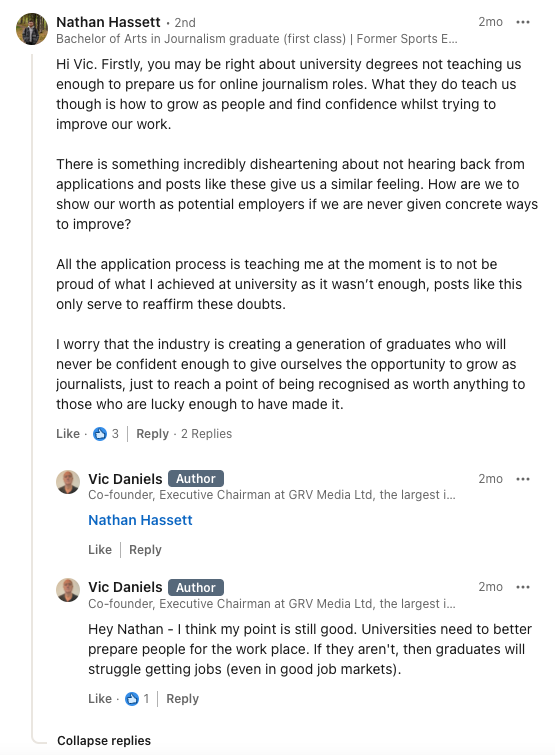From LinkedIn comment to newsroom editor: how one journalism graduate turned frustration into opportunity
A young jobseeker called out an industry leader for criticising students' skillsets - and ended up being offered a job



A young jobseeker called out an industry leader for criticising students' skillsets - and ended up being offered a job


This article was migrated from an old version of our website in 2025. As a result, it might have some low-quality images or non-functioning links - if there's any issues you'd like to see fixed, get in touch with us at info@journalism.co.uk.
When Nathan Hassett was scrolling through LinkedIn in the back of his mother's car on the way to Aldi, he was not expecting to secure his first journalism job. But a candid response to an industry leader's post about graduate journalists would change the course of his career.
"I was checking LinkedIn, just in case something came up," says the 23-year-old University of Stirling graduate who, like many of his peers, had been struggling to find work. "I'd normally just look at that kind of post and maybe share it with a friend. But this time, I wanted to say something most students would want to say but didn't know how."
The post in question came from Vic Daniels, co-founder and executive chairman of GRV Media, who expressed frustrations about graduate journalists' skills. After 20 unsuccessful job applications across journalism, communications and sports reporting roles, Hassett felt compelled to speak up.

"It was just never hearing back from job applications and then seeing that we don't have the skills," says Hassett, who had experience reporting for both his university's football club and the Stirling Observer local paper.
His response caught Daniels' attention. At 10 pm one evening, about two weeks after Hassett’s comment, a LinkedIn direct message arrived in his inbox. What followed was unexpected.
Rather than taking offence at being called out, Daniels invited Hassett for an informal chat, during which he offered him a chance to prove his abilities.
"I think he saw this either as an opportunity to find talent or at least prove me wrong," Hassett recalls. After completing a test piece, he was invited to join GRV Media's Writers' Lab, where he learned practical skills like SEO and writing for Google Discover.
But the real surprise came when, instead of a writer position, Hassett was offered a role as Writers' Lab editor - a position he had not even considered within his reach.
"It felt strange to be a grad editing work of people who were experienced journalists," he admits. "From all my friends, we were not supposed to be editors yet. I feel a bit overwhelmed but it's something I feel I'm good at."
The role has already changed his life, allowing him and his partner to secure a flat - something that had been impossible without a contracted job. He also wants to use his new position to train more graduates seeking their opportunity.
For journalism graduates still searching for their break, Hassett's advice is clear: "Whatever you're doing - write, take pictures, replicate the style of the publication you’re interested in and show it. The hardest part is not having the chance to show talent and passion and what we've learned. For editors, having a piece to read is so much more than just sending a CV."
And perhaps most importantly: "Be ready to challenge some important people on LinkedIn. I think people in the media respect that. Engage in debate."
Sometimes the most unconventional paths can lead to unexpected opportunities. As he puts it: "The most frustrating thing is not getting the chance to show your talent. Proactively show employers the work that you can produce, and I'm sure the chances will come."
After more networking and connection? Join us on 27 November 2024 at our digital journalism conference Newsrewired in London. Check out the full agenda and grab your ticket today